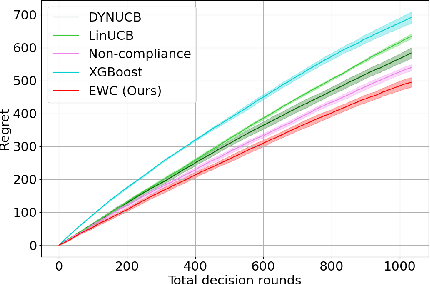Tianyue Zhou
Structure Detection for Contextual Reinforcement Learning
Jan 13, 2026Abstract:Contextual Reinforcement Learning (CRL) tackles the problem of solving a set of related Contextual Markov Decision Processes (CMDPs) that vary across different context variables. Traditional approaches--independent training and multi-task learning--struggle with either excessive computational costs or negative transfer. A recently proposed multi-policy approach, Model-Based Transfer Learning (MBTL), has demonstrated effectiveness by strategically selecting a few tasks to train and zero-shot transfer. However, CMDPs encompass a wide range of problems, exhibiting structural properties that vary from problem to problem. As such, different task selection strategies are suitable for different CMDPs. In this work, we introduce Structure Detection MBTL (SD-MBTL), a generic framework that dynamically identifies the underlying generalization structure of CMDP and selects an appropriate MBTL algorithm. For instance, we observe Mountain structure in which generalization performance degrades from the training performance of the target task as the context difference increases. We thus propose M/GP-MBTL, which detects the structure and adaptively switches between a Gaussian Process-based approach and a clustering-based approach. Extensive experiments on synthetic data and CRL benchmarks--covering continuous control, traffic control, and agricultural management--show that M/GP-MBTL surpasses the strongest prior method by 12.49% on the aggregated metric. These results highlight the promise of online structure detection for guiding source task selection in complex CRL environments.
The Nah Bandit: Modeling User Non-compliance in Recommendation Systems
Aug 15, 2024



Abstract:Recommendation systems now pervade the digital world, ranging from advertising to entertainment. However, it remains challenging to implement effective recommendation systems in the physical world, such as in mobility or health. This work focuses on a key challenge: in the physical world, it is often easy for the user to opt out of taking any recommendation if they are not to her liking, and to fall back to her baseline behavior. It is thus crucial in cyber-physical recommendation systems to operate with an interaction model that is aware of such user behavior, lest the user abandon the recommendations altogether. This paper thus introduces the Nah Bandit, a tongue-in-cheek reference to describe a Bandit problem where users can say `nah' to the recommendation and opt for their preferred option instead. As such, this problem lies in between a typical bandit setup and supervised learning. We model the user non-compliance by parameterizing an anchoring effect of recommendations on users. We then propose the Expert with Clustering (EWC) algorithm, a hierarchical approach that incorporates feedback from both recommended and non-recommended options to accelerate user preference learning. In a recommendation scenario with $N$ users, $T$ rounds per user, and $K$ clusters, EWC achieves a regret bound of $O(N\sqrt{T\log K} + NT)$, achieving superior theoretical performance in the short term compared to LinUCB algorithm. Experimental results also highlight that EWC outperforms both supervised learning and traditional contextual bandit approaches. This advancement reveals that effective use of non-compliance feedback can accelerate preference learning and improve recommendation accuracy. This work lays the foundation for future research in Nah Bandit, providing a robust framework for more effective recommendation systems.
Expert with Clustering: Hierarchical Online Preference Learning Framework
Jan 26, 2024Abstract:Emerging mobility systems are increasingly capable of recommending options to mobility users, to guide them towards personalized yet sustainable system outcomes. Even more so than the typical recommendation system, it is crucial to minimize regret, because 1) the mobility options directly affect the lives of the users, and 2) the system sustainability relies on sufficient user participation. In this study, we consider accelerating user preference learning by exploiting a low-dimensional latent space that captures the mobility preferences of users. We introduce a hierarchical contextual bandit framework named Expert with Clustering (EWC), which integrates clustering techniques and prediction with expert advice. EWC efficiently utilizes hierarchical user information and incorporates a novel Loss-guided Distance metric. This metric is instrumental in generating more representative cluster centroids. In a recommendation scenario with $N$ users, $T$ rounds per user, and $K$ options, our algorithm achieves a regret bound of $O(N\sqrt{T\log K} + NT)$. This bound consists of two parts: the first term is the regret from the Hedge algorithm, and the second term depends on the average loss from clustering. The algorithm performs with low regret, especially when a latent hierarchical structure exists among users. This regret bound underscores the theoretical and experimental efficacy of EWC, particularly in scenarios that demand rapid learning and adaptation. Experimental results highlight that EWC can substantially reduce regret by 27.57% compared to the LinUCB baseline. Our work offers a data-efficient approach to capturing both individual and collective behaviors, making it highly applicable to contexts with hierarchical structures. We expect the algorithm to be applicable to other settings with layered nuances of user preferences and information.
 Add to Chrome
Add to Chrome Add to Firefox
Add to Firefox Add to Edge
Add to Edge